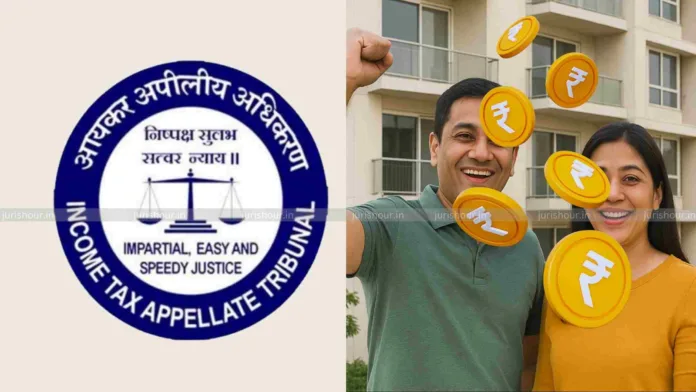The Mumbai Bench of Income Tax Appellate Tribunal (ITAT) has allowed the Long Term Capital Gain (LTCG) tax exemption Rs. 1.3 Crore granted to husband-wife despite 2 properties sold.
The bench of Kavitha Rajagopal (Judicial Member) and Renu Jauhri (Accountant Member) has observed that benefit under section 54 of the Income Tax Act cannot be denied merely because the property was purchased jointly in the name of the assessee and her husband, where in case of property held jointly the capital gain shall be calculated for each owner in accordance with the funding and allocation of shares of the house properties for claiming tax benefits.
The bench directed that the AO shall verify that there has been no double deduction claimed by the assessee and her husband on the capital gain arising out of the sale of property claimed by the assessee and to allow deduction under Section 54 of the Income Tax Act to the extent of the investment made by the assessee on the purchase of the new property.
The appellant/assessee, Tejal Kaushal Shah is an individual and had filed her return of income declaring total income The assessee’s case was selected for scrutiny and notices were duly issued and served upon the assessee. The Assessing Officer observed that the assessee has shown long term capital gain (LTCG) of Rs. 1,30,30,729 on sale of immovable property after claiming benefit of indexation and further the assessee has claimed exemption under section 54 of the Income Tax Act for the new property purchased vide a deed of transfer.
The AO observed that the total consideration for purchase of new property was Rs. 2,31,00,000 out of which the assessee has paid Rs. 1,76,00,000 and her husband Kaushal Anil Shah has paid Rs. 55,00,000 where the assessee and her husband were claimed to be co-owners of the new residential house purchased by them.
The AO also observed from the return of income of the assessee’s husband that he had sold some other property which resulted in capital gain and that he has also claimed deduction under section 54 of the Act with respect to the new property which was jointly purchased by the assessee and her husband.
The AO rejected the claim of exemption in assessee’s case for the reason that exemption under section 54 has been claimed both by the assessee and her husband separately for contributing in purchase of new residential house and further the AO held that the new property has been purchased by transferring two residential houses which is violating the condition of Section 54.
The AO stated that the assessee’s husband’s name is mentioned as the ‘First Owner’ in the purchase agreement of the old property which was sold by the assessee in which the assessee’s name is mentioned only as the ‘Second Owner’ for which the assessee contends to be an error crept in the registered agreement.
The AO held that the assessee has failed to furnish documentary evidences such as bank statement to show that the payment for purchase of old property was made by the assessee and not her husband and has also failed to furnish copy of purchase and sale agreement of the old property to establish the mode of payment.
The AO made an addition/disallowance. The AO also made an addition of Rs. 10,43,158 on the annual let out value of the office premises located at Juhu lane under section 23(1) of the Income Tax Act after considering the fair rental value of office located in the neighborhood as available in the website www.magicbricks.com and determined total income of the assessee at Rs. 1,46,19,990.
The assessee contended that the conditions of Section 54 was fulfilled and only the amended provision of Section 54 specifies ‘purchased’ or constructed ‘One’ residential house in ‘India’ instead of ‘a residential house’ which was only w.e.f. 01.04.2015.
The department contended that the assessee has violated the conditions of Section 54 where exemption has been claimed against sale of two residential houses one by the assessee and by her husband where they have invested in a single residential property. The assessee has failed to establish that the old property which was sold was purchased by the assessee, where from the sale agreement it is evident that the assessee’s husband’s name is mentioned first as the purchaser.
Section 54 of the Income Tax Act states that the capital gain which arises from the transfer of a long term capital asset being buildings or lands appurtenant thereto and the same being a residential house where the assessee has within a period of one year before or two years after the transfer purchased or within a period of 3 years after the date of transfer constructed a residential house is entitled to claim deduction under this provision. Upon considering the same, we do not find any embargo for the assessee to claim deduction under this provision either as a co-owner, or on sale of one or two residential properties or on purchase of a residential property as a co-owner.
The tribunal did not find any expressed bar for the assessee to claim the said deduction on a property which has been jointly purchased by the assessee.
The ITAT held that courts have taken a liberal view with regard to the claim of Section 54 and Section 54F which are beneficial provisions that are to be interpreted liberally in favour of the assessee and deduction should not be merely denied on hyper-technical ground.
Case Details
Case Title: Smt. Tejal Kaushal Shah Versus ITO
Case No.: ITA No. 3303/Mum/2024
Date: 17.04.2025
Counsel For Appellant: Reepal Tralshawala
Counsel For Respondent: Hemanshu Joshi (Sr. DR)
Read More: Refund Of Service Tax Paid Under Mistake Of Law Allowed With 12% Interest: CESTAT

